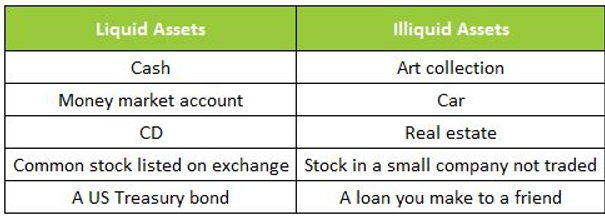Liquid
View FREE Lessons!
Definition of Liquid (Economic):
Liquid describes an asset that is easily converted to cash at the market price. It is also used to describe people and businesses with enough cash to meet their obligations.
Detailed Explanation:
Liquidity is a measure of how easily an asset can be turned into cash. To understand the concept, ask yourself the question: “If I needed cash in a couple of days, how quickly and easily could I convert an asset to cash? Would I have to sell the asset at a steep discount?” The asset would be very liquid if you could sell it quickly without having to discount it. Of course, cash is the most liquid asset. You could convert your money market account and CD into cash, so they are also examples of liquid assets. You could sell your stock if it is traded on a stock exchange, so stock is considered a liquid asset. However, stock in privately held small companies may be hard to sell, so it is not very liquid. An illiquid asset is any asset that cannot be easily converted to cash without significantly discounting the price.
Some may claim a car is a liquid asset because it can be sold in a day. However, in order to sell it quickly, the owner will likely be forced to drastically reduce the price. This makes a car an illiquid asset. The same is true for real estate that needs to be sold in a hurry. Sellers who are moving and need a down payment on a home may be forced to drastically reduce their price to attract a buyer. A real estate market is more liquid (but still considered illiquid) when there is a “seller's” market. Houses generally remain on the market for short periods and buyers pay close to the listed price. Real estate is more illiquid when there is a “buyer's” market. Homes sit on the market for longer periods, so sellers are more willing to accept lower prices.
An asset is generally more liquid when there are many potential buyers, who are easily identified. Ideally, they would bid against each other for a good or service. Stocks listed on exchanges are liquid because the exchange brings together many buyers who are willing to purchase shares at the market price almost as soon as the stock is offered. Conversely, many sellers come forward when a buyer offers to buy the shares at the market price. It is unusual for a seller or buyer to adjust the bid or asking price significantly. Other assets, such as CDs and money markets are liquid because they are near cash. In other words, they have a widely accepted value. CDs are less liquid than cash because there may be a penalty for selling prematurely.

A jumbo mortgage is a residential loan equal or greater than $417,000 in most areas of the United States. Prior to the financial crisis, jumbo loans were liquid assets. Lenders were able to sell them to pension funds and other investors. Almost overnight the liquidity of jumbo loans disappeared. Pension funds and other investors were concerned about the mortgage market and were reluctant to purchase these loans. Many lenders that offered jumbos with the intent of selling them left the industry. Many buyers of large homes had trouble obtaining a mortgage because jumbo loans had become illiquid. Fortunately, the problem was temporary and there is now a market for jumbo loans.
In accounting, liquidity refers to the ability of a company to pay its bills. An illiquid company may not have enough cash to meet its payroll even if the company owns other assets such as real estate, receivables, and equipment.
Dig Deeper With These Free Lessons:
Capital – Financing Business Growth
Understand A Stock’s Performance Using Supply and Demand
